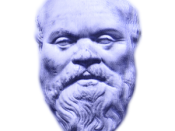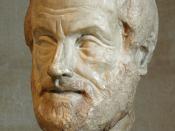Presenting some of the most intellectual and thought provoking ideas ever conceived in the realms of politics, theology, and ethical theory; Aristotle's works remain as pivotal today as they have for centuries past. Of particular importance is his (supposed) collection of lectures we've come to know as the bounded Nicomachean Ethics, which will be the focal point for this work. Our particular interest lies within Book One of the aforementioned work, and deals with Aristotle's notion of happiness and his systematic deliverance of the many views held about the topic itself. Is happiness something permanent? Can the happy man lose his happiness? Can we know that someone is happy during his own lifetime?
Before we embark upon any such attempts to answer these questions, we must first attain a grounded understanding of what exactly Aristotle's notion of happiness encompasses, and furthermore, how it is attained. Throughout Book One of the Nicomachean Ethics, we are bombarded with a countless number of highly analytical notions pertaining to different variables which comprise mans most desirable concept, the good we seek, being that of happiness; the sake or end for which all else is done .
Thought to be an almost god given attribute, Aristotle's notion of happiness resided in the conditioning of oneself, to act in such a manor that would allow mans given actions to be in accordance with virtue, ergo enriching his soul.
Existing as the prize or end to a life of excellence and virtue, happiness is seen as the product of learning, discipline, and training of the self (which allows man to shape his god given morality and do so in such a way as to always act in a just manner), in collaboration with a virtuously lead life . Though Aristotle presents us with the notion...


